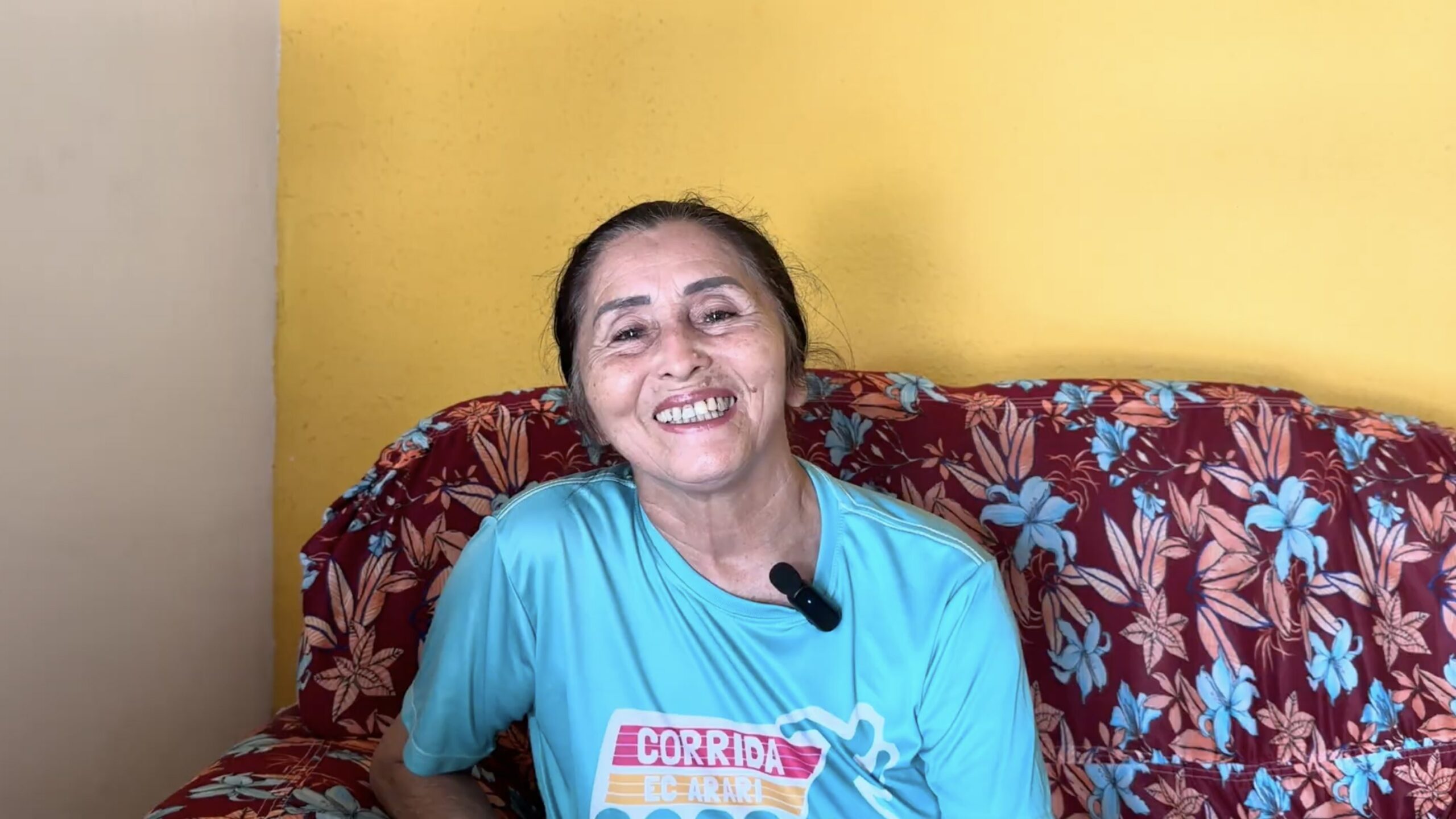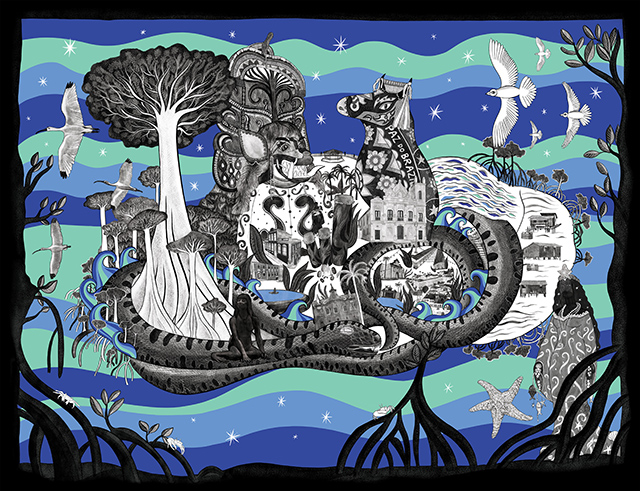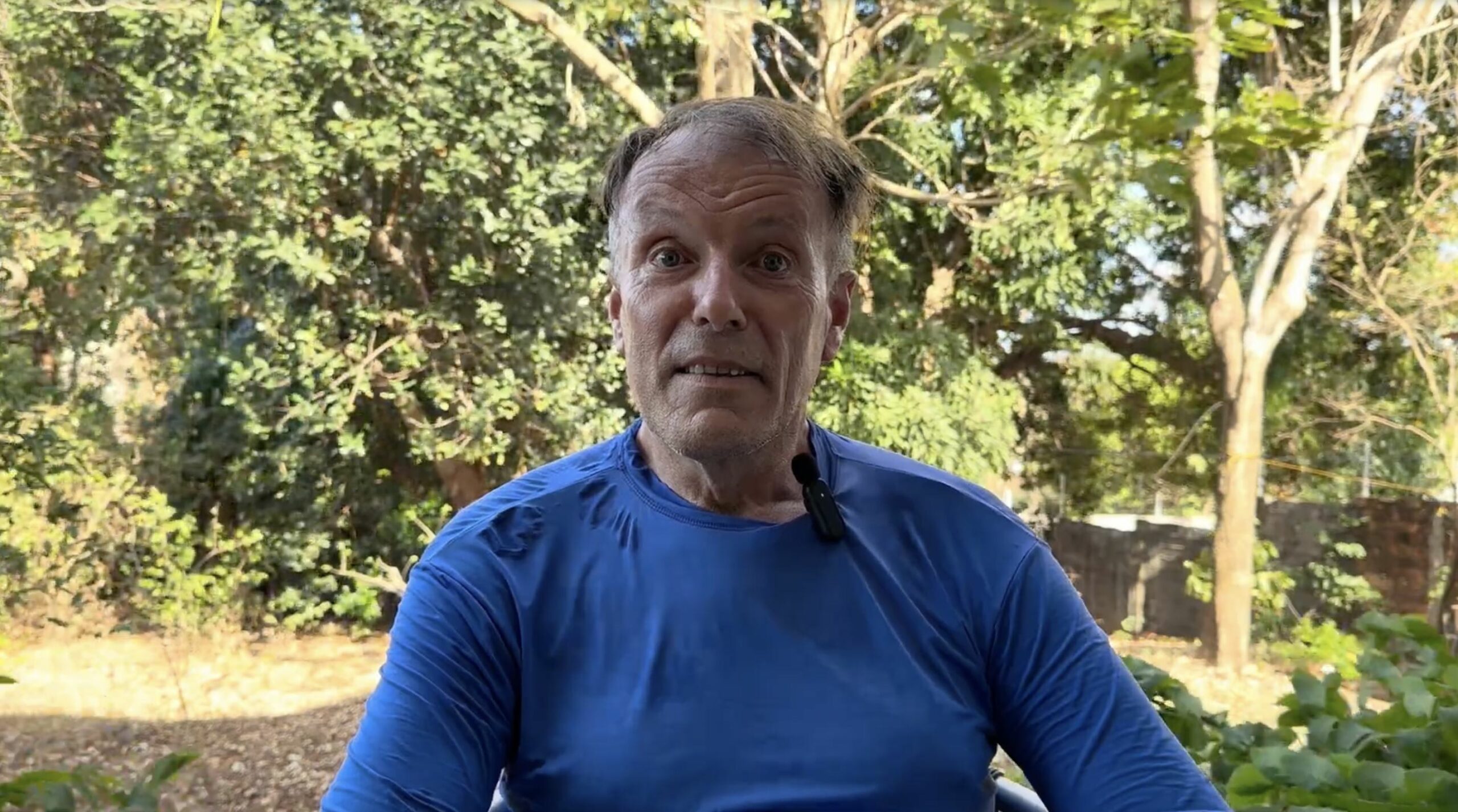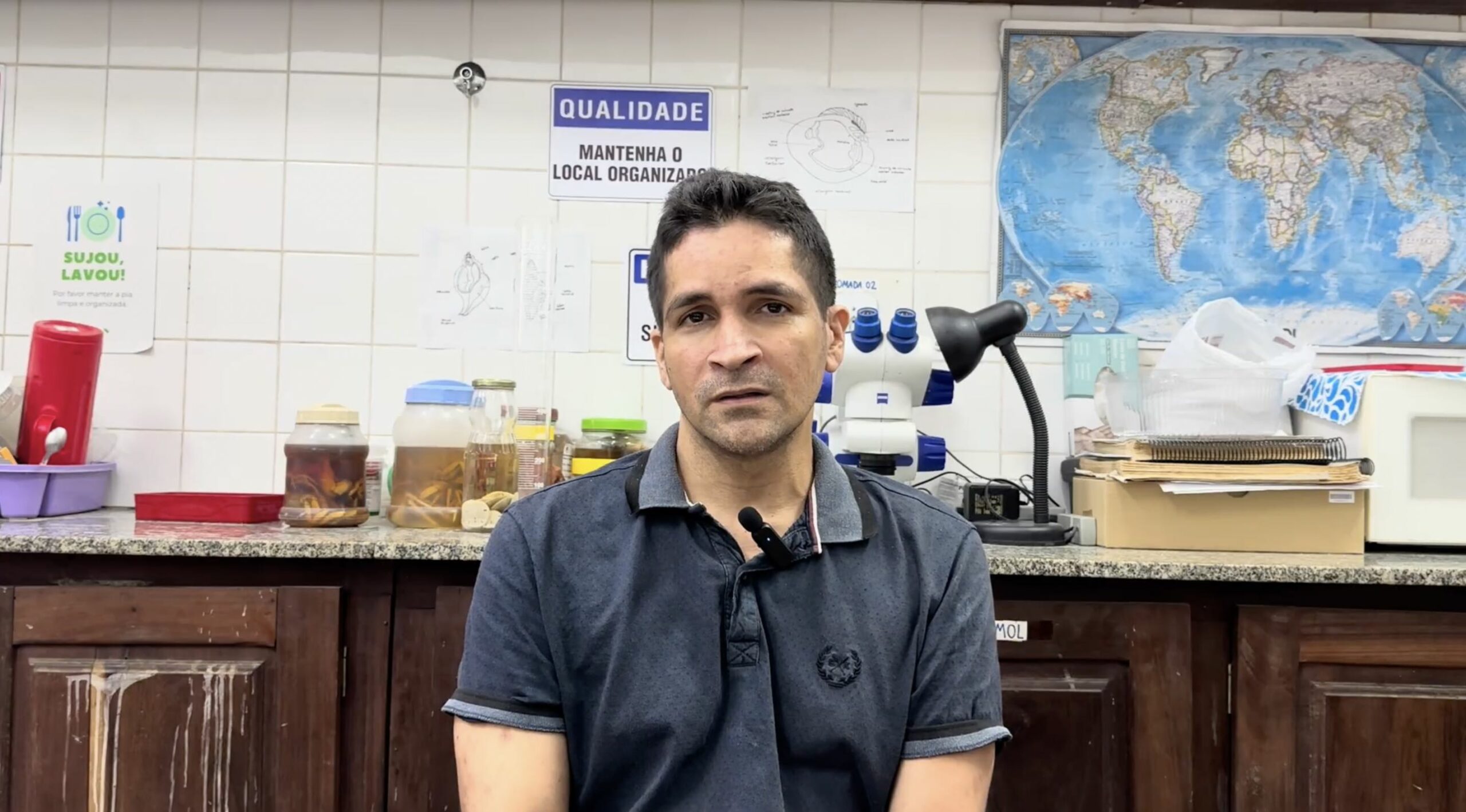
In Curral da Igreja, in the heart of the municipality of Arari (Maranhão), Beth embodies a living memory of community commitment to access to water. A physical education teacher and chair of the management committee for the Água para Todos programme, she looks back on the installation of a network of cisterns and the close relationship that residents have with the Mearim River.
Community action for water
« I was born here in Curral da Igreja, and I still live here. Alongside my work as a teacher, I chair the management committee for the Água para Todos programme. «
This programme, which is of vital importance to the region’s inhabitants, has enabled the installation of rainwater harvesting tanks with a capacity of 16,000 litres. These facilities are changing lives in an area where access to drinking water is scarce or non-existent. The water collected is used for both consumption and daily hygiene.
‘We have always been particularly attached to these tanks because they represent a vital resource.’
Originally, the committee was made up of eighteen volunteers. Today, only three people continue this mission — a sign, according to the professor, of the difficulties inherent in social engagement without financial compensation.
Mobilisation without political exploitation
The initial project planned to install 370 tanks. Thanks to rigorous management and local mobilisation, more than 1,100 units were ultimately installed in 74 communities in the region.
‘It all started with an information and registration meeting. It is important to emphasise that no local or regional politicians were involved. This was a deliberate choice to ensure neutral and fair implementation.’
The project is funded by the Brazilian federal government as part of a programme for semi-arid areas. Although Maranhão is not classified as such, some of its municipalities – including Arari – have been included in this scheme, probably as a result of local assessments and political decisions taken at national level.
« The initiative was a blessing for us. It was carried out without the involvement of local elected officials, in order to avoid any political exploitation in the run-up to the elections. ‘
The Mearim River, between memory and transformation
When asked about the Mearim River, Beth offers a sensitive account, blending childhood memories with contemporary observations.
’The phenomenon of the pororoca (a natural phenomenon caused by the collision of river and ocean waters) has always existed here. It occurs at every full moon or new moon, when the rising tide flows up the river. In the past, the river was narrower and deeper, and the force of the waves caused erosion of the banks, sweeping away trees and land. »
This displaced land gradually fills the riverbed, which increases silting and alters the behaviour of the tides. These changes have a direct impact on local living conditions.
‘To drink water, we had to watch for the rising tide. As soon as the tide came in, we ran to fill cans or buckets before the water became too salty.’
Despite these constraints, the river remained the main source of livelihood for a long time.
« We lived exclusively from fishing. There has never been much agriculture here. We washed our clothes on the riverbanks and spent our days there. The river was our life. ‘
Seasons marked by the river
Beth accurately describes the climatic rhythms that structure the lives of the communities living along the Maranhão. There are two main seasons: a dry summer from July to December and a rainy winter from January to July.
’During the winter, it rains heavily, which is rather welcome. It’s not this period that worries us. Summer, on the other hand, is more problematic. »
The seasonal cycle has a direct impact on the water supply. For a long time, residents depended exclusively on the river for all their domestic activities, including drinking water. Today, artesian wells and cisterns provide easier access to better quality water.
‘We now use the well for domestic tasks such as washing clothes, and we drink water from the cistern. Before that, we used to buy water when we could.’
Declining biodiversity
While the Mearim River was once an inexhaustible source of fish and life, the situation has changed.
‘Since rice fields were established in the area, fish have become increasingly scarce. This worries us because we live off the river. It is our main source of livelihood.’
Mangrove deforestation, mainly for the artisanal manufacture of construction scaffolding, is exacerbating erosion. The trees, by protecting the banks, acted as a bulwark against the river’s assaults.
‘When the trees are cut down, the banks become vulnerable. With the high tides, the waves hit the shore unchecked, washing away the earth.’
When nature meets industry
Beth clearly distinguishes between natural phenomena, such as the pororoca, and other aggravating factors linked to human activity: global warming, reduced rainfall, fires and, above all, agricultural pollution.
‘The pororoca has always existed, but it is becoming more devastating because of the silting up of the river, which is exacerbated by erosion and deforestation.’
In the past, dredging the riverbed helped to limit this silting. This federal project was halted without explanation. The machines are still there, but they are not being used.
‘We fear that the river will soon be unnavigable, that the pororoca will disappear, and that we will be cut off from our environment for good.’
The impact of irrigated rice and pesticides
A major ecological turning point came in the early 2000s with the arrival of producers from southern Brazil, who introduced intensive irrigated rice cultivation.
« All the water used comes from the river. It is pumped out and then discharged loaded with pesticides and toxic products. These substances can contaminate the soil for centuries. ‘
These practices have a serious impact on biodiversity and the health of local residents.
’Many people suffer from skin or stomach problems. There is no official diagnosis, but we know that the water is contaminated. »
The professor deplores the inaction of the public authorities. No initiative has been taken to assess the impact, despite repeated warnings.
‘I spoke to a former city councillor. He told me that the poison kills parasites, but that there was nothing to worry about. That kind of response is worrying.’
The silence of residents and the lack of analysis
Faced with pollution, a sense of collective powerlessness is setting in.
» Some residents remain silent out of fear, others because they lack information. And the authorities are not taking action. Yet everyone knows. »
An attempt to analyse the water quality was carried out by a teacher at the State University of Maranhão (UEMA). The results were clear: the river water was unfit for consumption, including for domestic use.
‘If we could obtain rigorous scientific data on the toxicity of the water at the rice crop discharge points, it could trigger a reaction. We need evidence to take action.’
The urgent need for environmental education
A committed teacher, Beth advocates for environmental education from an early age to raise awareness among young people about the issues that directly affect them.
‘Schools have already incorporated some concepts of ecology, but this is still not enough. We need to educate citizens who are aware and capable of defending their territory.’
Educating young people about their role as citizens of the living world
In a context of ecological crisis and institutional disengagement, Beth remains driven by a firm conviction: to educate younger generations to become guardians of their territory.
‘We take them to see the river to show them the impact of every action. They need to understand that they can make a difference, even with small actions.’
Through her work in local schools, she strives to raise awareness of environmental issues.
« Even if it’s not drinkable, water is still precious. And today, the salt tide is rising higher up the river than before. It carries with it the pesticides discharged upstream, all the way to the sea. »
A fight without support
However, Beth is coming up against a brick wall: a lack of support from the authorities, a lack of resources and the inertia of certain local players.
‘I don’t know if we’re knocking on the wrong doors or if it’s the method that needs to be reviewed. But we have no support.’
Despite this, she refuses to give up. The very word “abandon” is banned from her vocabulary.
« I always tell my students: ‘Abandon is a verb we must never conjugate. Even when it doesn’t work, we must persevere, engage in dialogue and seek solutions together.’‘
Dialogue with decision-makers and polluters
Beth clearly identifies the responsibilities of the intensive rice farming practices introduced by large-scale farmers from other regions.
’Three or four producers from the south are causing immense damage on their own. »
She does not refer to them as enemies, but calls for dialogue to propose environmentally friendly agricultural alternatives. Less invasive methods exist, particularly in a state like Maranhão, which has abundant rainfall.
« There are solutions. We can farm without these pesticides that kill the soil for 300 years. We have to want to find them, and to do that, we have to talk. ‘
The peaceful weapon of interdisciplinarity
For Beth, education must be cross-disciplinary and rooted in the everyday reality of students.
’I tell my students: you can learn by playing basketball in the village square. But next to you, your geography teacher is explaining the territory, your Portuguese teacher is helping you to speak properly, and your science teacher is helping you to understand your body. ‘
She advocates active, collective teaching that involves all teachers in a global educational project: to make students agents of change, not mere recipients of knowledge.
’What you throw on the ground is not for someone else to pick up. You are responsible. And if you understand that as a child, you will pass it on to those around you. »
Teaching by example
Beth believes that teaching goes far beyond the classroom. She works in the streets and villages, with children and families.
‘I tell them: the water you have in your cistern is a blessing. It doesn’t fall from the sky every day. Don’t waste it.’ ‘
This sacred relationship with water – a gift from nature – shapes her thinking. The cistern project, which she describes as a valuable collective effort, is also an educational experience: learning to manage a scarce resource and understand its value.
’We are the guardians of the cistern. 16,000 litres of water is a treasure. »
A message for future generations
In conclusion, Beth shares a clear, powerful message addressed to her students and to all those listening to her:
‘The planet is our home. There is another way of doing things, a fairer, more sustainable way. And to achieve this, we need to talk. Dialogue is our best weapon.’
She reminds us that each generation has a responsibility to the next.
‘We must leave the earth in good condition for those who come after us. If we sow healthy seeds today, they will bear fruit tomorrow.’
Testimonies from the same panel


